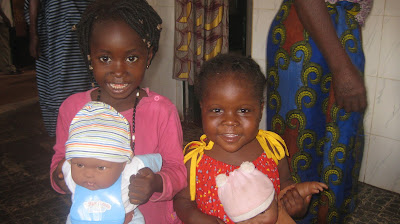Sierra Leone has been in the news recently because of the
cholera epidemic spreading throughout the country. It started in Freetown but cases have now
been documented in all the districts except one. Our hospital has not been immune.
A couple weeks ago I was down in the OB ward, getting ready
to go home at about 9:30pm. I was
literally walking out the door when one of the nursing aids came and asked me
to see a patient that had just come in. I walked down to the ER (ie the bench
outside the nurses station) to see what was going on.
The guy in front of me was a young, healthy looking guy, but
was in rough shape. He said he had just
arrived from Freetown that day, and had been vomiting and having diarrhea since
that evening. As soon as he said he’d
come from Freetown, a little light went off. I’d just come from Freetown myself
and had seen all of the signs posted and heard the radio announcements about
the cholera epidemic, what people should do to prevent it, when to go to the
health center, etc, so it was higher on my radar than it usually would have
been.
Of course I’ve seen plenty of diarrhea and vomiting cases….but
this guy seemed a little different.
During the interview he had leave a couple different times to go vomit
and or use the bathroom. When the
cholera episodes first started appearing, I took to ole’ Google and researched
the signs as well as how to treat it. It’s
actually a simple treatment of IV fluids and/or oral re-hydration salts. Oftentimes people will add an antibiotic
because although it isn’t curative, it has been shown to decrease the duration
of the diarrhea and vomiting.
I admitted the guy and started him on IV fluids and the
antibiotic and called one of the docs to let him know what I was
suspecting. He agreed with my plan so we
put the guy in a private room and started his treatment. I went down to see him the next afternoon and
was doing much better. The day after that he was discharged.
We didn’t see much else that we suspected could be cholera until
about a week or two ago. At this point
we’ve had four confirmed cases and others that were probable cases but we didn’t
have the testing to confirm it. We’ve
made some changes to the hospital now and have moved all the women down to the
OB ward so we can have the womens medical ward for the male cholera patients
and the womens surgical ward for the female cholera patients.
While cholera is relatively simple to treat, it can be extremely
deadly. The fluid loss is just so extreme that if it’s left untreated for 24
hours, it can kill. Since patients aren’t
always quick to come to the hospital (see other bazillion posts about patients
coming too late) it can easily kill. It’s also very easily transmitted
(oral-fecal transmission….yum!)
It turns out that trying to contain cholera isn’t easy! Now me, I hear cholera and I think hmm…I don’t
want to go anywhere near that! When we
realized that we were seeing multiple cases, we decided to limit visitors and
only allow one visitor per patient. We
went up and down the wards kicking patients out, but they kept finding their
way back in. My friend explained that if
you ask a family member to leave the patient, they automatically think that the
patient is dying and so will do whatever they have to to be near the
patient. He had one family member that
he had repeatedly asked to leave, but kept coming back. Later when he asked this family member if the
patient was drinking the ORS (oral re-hydration salts) like he was supposed to
the family member said that yes, he was drinking it, but the family member had
also started having diarrhea so was drinking some of it as well. Frustrating!!! We’re currently working on getting some
better security and educating the community on the various dangers. The WHO came a few days ago to see how we
were handling things and the government is supplying free IV fluids to the
hospital for all the cholera patients. We’re
very grateful that we haven’t seen any deaths (although we were fearful for one
guy in particular!) and our patients are improving.
Ironically, last week was a red letter week for me, as I
received 3 different marriage proposals.
It had been awhile! To be fair
two of them were by one person who initially wanted me for his son but when I
said he was too young offered to marry me himself. This was of course after I’d already met his
wife. It must be true what they
say. Cholera is in the diarrhea….love is
in the air.


